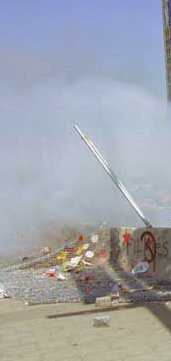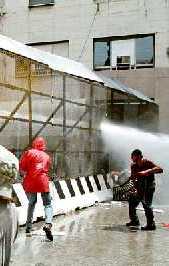 After the assembly, Martin takes us across a football pitch that has probably never seen grass and whose goals are so rusty that they seem to have been bent by the wind that blasts across this place. He shows us the "Copa de Leche", the project which distributes milk to children. It is in a squatted building next to an occupied plot of land.
After the assembly, Martin takes us across a football pitch that has probably never seen grass and whose goals are so rusty that they seem to have been bent by the wind that blasts across this place. He shows us the "Copa de Leche", the project which distributes milk to children. It is in a squatted building next to an occupied plot of land.
They took the fences down that surrounded the land. All that remains of them are a few broken concrete posts. The rest have been cut up and used to build a brand new oven for baking bread. The old fence posts are literally what makes up the base of a huge roaring outdoor oven standing on the edge of this deserted football pitch and surrounded by newly dug vegetable plots. On the side of the oven one could just make out the words 'Cambio Social' - social change - roughly painted there the day before by young piqueteros, trying out their paint brushes during the puppet-making workshop.
Two huge guys are stoking the fire and as we arrive we see them pull out a tray of freshly baked bread. Their faces erupt with pleasure as they set eyes on the steaming loaves, the first batch ever to come out of the oven. They pass them to an elderly woman who takes them into the building, only to return a few seconds later scowling and handing them back, saying they haven't been cooked enough, that the dough inside is still raw. The men hang their heads with bruised pride and hastily stuff the tray back into the oven.
Fences coming down has been one of the most powerful images of emancipatory movements throughout history, a perfect practise and metaphor for challenging the enclosure of life and land by capital. It was the 18th century philosopher, Jean-Jaques Rousseau who said of the first man who enclosed a piece of land as his own, "If only someone had pulled up the stakes and cried to his fellows: 'You are undone if you once forget that the fruits of the earth belong to us all, and the earth itself to nobody!"
Unfortunately no one cried out then, but stakes have been pulled and fences been falling for hundreds of years - from the 16th Century Diggers to the assaults on the security fences during the actions against Free Trade of the Americas Agreement (FTAA) in Quebec and G8 in Genoa.
 The image of fences being pulled down and the posts being turned into something practical strikes me as a beautiful metaphor for the transformation of the enclosures of capital into creative autonomous tools of social revolution. A transformation which involves people beginning to build the life that they want and preparing to defend it rather than simply protesting against what they don't want.
The image of fences being pulled down and the posts being turned into something practical strikes me as a beautiful metaphor for the transformation of the enclosures of capital into creative autonomous tools of social revolution. A transformation which involves people beginning to build the life that they want and preparing to defend it rather than simply protesting against what they don't want.
Most of my life has been an attempt at finding a space where poetic acts and pragmatic solutions merge, a space between the imagination of art and the social transformation of activism, between utilitarianism and utopia, symbols and survival.
But I realise that it is perhaps a luxury to dwell on the beauty of metaphors when faced with hunger. Here fences were torn down and were transformed by people, most of whom had never even heard of Quebec, Genoa, or the Diggers, but who simply knew how to make the best use of a redundant fence.
Earlier, Martin had illustrated some of the difference between the symbolic nature of protest and the pragmatic nature of social revolution. He told me that they had once used a banner against the FTAA during a road block, but that they couldn't do an action against the FTTA itself. He re-emphasised the fact that the road blocks are specific tools to get specific demands. "You couldn't do one to demand that the FTAA is abolished, because it's too much risk with no direct reward," he explained. "When you do an action with a pragmatic end, even if you fail the first time, then the next time you try harder. No one would be willing to risk so much for an abstraction."
This same dichotomy came up again the following day when I am shown the indoor bakery. On the wall are beautiful ceramic tiles, a blast of colour amongst the dusty greys and browns of Admiralte Brown. "How beautiful," I say.
"Yes," says Astor, "a ceramicist made them for us and gave us a furnace too."
"Great," I think, imagining the piqueteros making tiles and giving their houses some brightness.
"But we are trying to work out how to transform the furnace into a bread oven - we don't need tiles." He takes a deep intake of breath. "Trouble is it burns too hot."
I don't remember who it was who asked the provocative question, "What is more beautiful? The paintings of the Sistine chapel, or the sight of carts in the morning bringing bread to the poor?". My answer was always the later, yet I always want to resist the reduction of political acts to those of necessity. From my position of priveledge having never experienced the reality of poverty, it is easy to critique the politics of utilitarianism, feeling it determines limits of change before these limits are even known, that it strangles the spontaneity and creativity of radical action, that it dulls the imagination of a better future.
With these conflicts swirling around my head I say goodbye to Martin. "When I come back to Argentina I'll be able to speak good Spanish." I promise him. "Great," he laughs, "then you will be able to read Don Quixote."
Don Quixote - how could I forget! Suddenly his parting comment dissolves the false dichotomy that had muddled my thinking. It's not a choice between bread OR beauty. The dichotomy between imagination and reason, bread and roses doesn't exist. If your hungry bread IS beautiful and baking bread on occupied land is an act that is so filled with meaning, and symbolism, that few would miss its significance.
Don Quixote ,the 16th century tale of the delusional old man who thinks he is a knight errant travelling across Spain to right all wrongs, fighting windmills he believes to be giants, with Sancho Panza at his side, an illiterate but shrewd peasant primarily interested in eating and drinking, illustrates these false dichotomies perfectly. The differences between imagination and realism, fiction and reality are shown to be illusions throughout the book.
"Don Quixote is the best book of political theory," says Subcommandante Marcos, and apparently the book is always at his side. The most effective political practices are those that dissolve dichotomies and play with paradox. Zapatismo is a wonderful example of a practise where the beauty of symbols and the necessity of survival merge.
In Martin's laugh and parting words I see someone with a profound vision. An insurrectionary imagination that sees the poetry in a roaring bread oven, recognises the beauty in the fences coming down, and ultimately understands that from all this comes dignity. Dignity which all of us need more than any loaf of bread.
And when I look around me, in this landscape of deprivation I realise that the most beautiful thing here is exactly that, it is peoples dignity. Dignity that battles against exclusion. Dignity that is just as powerful and as beautiful as any colour, or poem, or song.
Those who live in Admiralte Brown have been forced to the edges of a system that only cares about the centre, only cares about those who can produce, who can contribute to the monster of economic growth that is choking the planet. Many have talked about the energy and creativity of the global movement of movements coming from the seams of society, erupting from the margins, from those who are without - the lesses - the landless, jobless, paperless, homeless. Here we are surrounded by the seams, a nowhere-land, a wasteland of wasted lives and wasted futures and yet here there is a spirit of creativity and struggle that is so strong, so solid and so irresistible.
The piqueteros know that you gain nothing by winning power. They don't want to take over the crumbling centre, they want to bring down all fences, and reclaim the edges, bringing life that's worth living back into their community. "We are building power, not taking it," is how Martin described it.
Whenever I asked people what had changed in their lives since they became involved in the MTD, they told me that the loneliness and isolation of unemployment and poverty had disappeared. They spoke of the power of togetherness and community. Tanya said to me, "The biggest change was the relationship with other people in the neighbourhood, the development of friendship and the possibility of sharing... When you're on a road block and you have nothing to eat, the people next to you share their food. Now I feel I'm living in a large family, my neighbours are my family."
The fear and mistrust sown by the military dictatorship destroyed connections between people and since then the dictatorship of the markets has built even more fences and separations, but the fences erected between people are now being pulled down by the strength of sharing.
When I asked Tanya, weather she was aware of any past examples of self-management and autonomy - the Diggers, the Paris Commune etc, she replied: "No, I don't know these things. All I know is that I have lived here, in the neighbourhood, all my life and I see that people don't have proper homes, or food to put on their table, or streets that aren't muddy tracks - and I don't know what name to give to what we are doing here, all I can call it is "social change ."